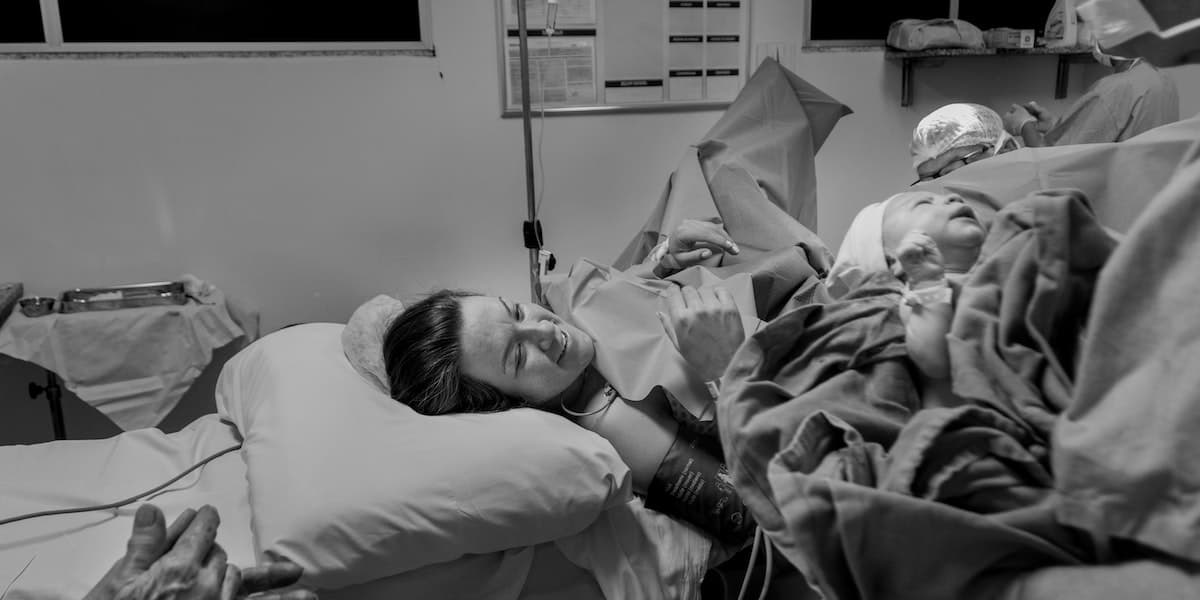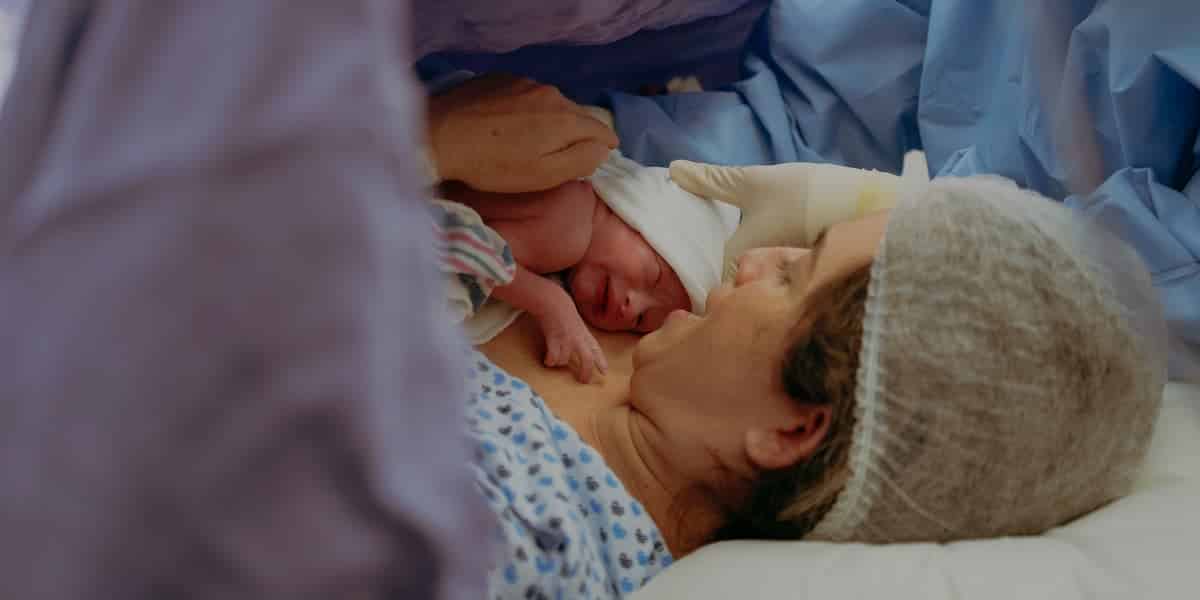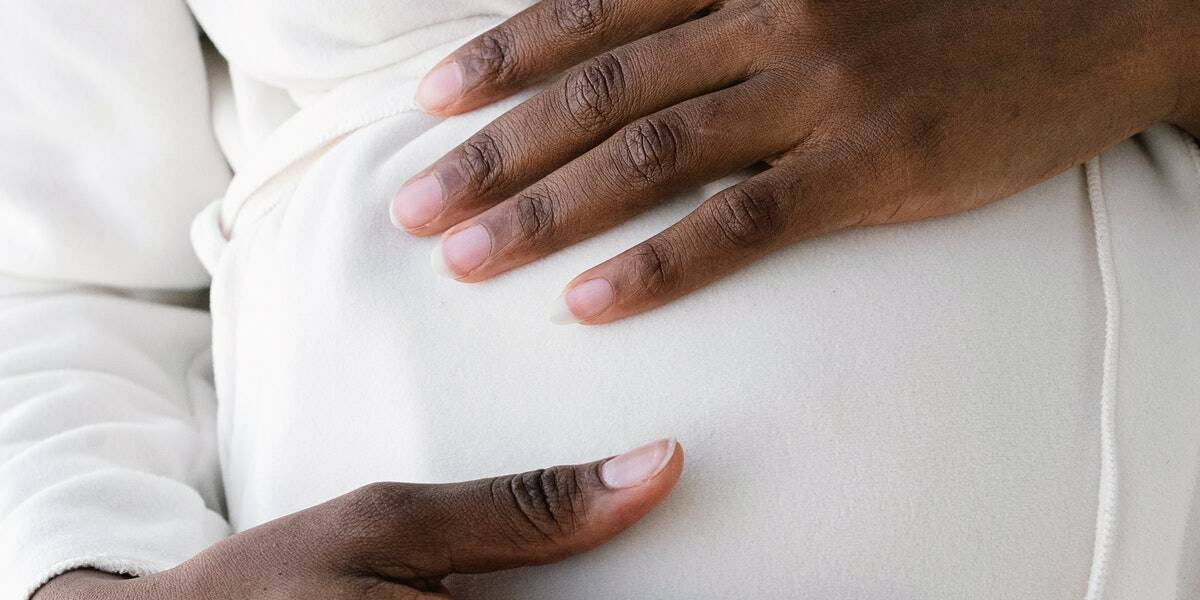Even if you do not have a c-section scheduled, being prepared can be a weight off your mind, from everything you need in the weeks leading up to surgery, to what you can eat before and after.
As an Amazon Associate, I earn from qualifying purchases. The links below may be affiliate links. Please read my disclosure policy for more information.
What is a C-section?
A cesarean section is a surgical operation to deliver the baby from your womb. The procedure involves surgically creating an incision through your abdominal wall and the uterus wall (womb) just above the bikini line.
This safe procedure is very common, as many as 30% of infants are delivered via cesarean in the United States, some people even opt to have a cesarean.
Most procedures are carried out using an anesthetic, be it spinal, epidural, or general.

What is the Need for a C-Section?
Most women do not plan to have a cesarean, however in some cases such as medical or risk of infection, a cesarean is required.
When a cesarean is planned it is called elective, and if it’s unplanned then it’s called an emergency cesarean.
Medical professionals can recommend a cesarean in the following cases:
- If the baby is in an awkward position, such as feet first (breech)
- If labor isn’t advancing as quickly as the doctors think it should be
- If your cervix (opening to your womb) if blocked by the placenta (also known as placenta previa)
- If the umbilical cord has prolapsed after your waters have broken
- If there are any possible health risks to you and your baby’s health
Health Risks Associated with a C-section
Cesareans are a common daily surgery, but despite this, it still has possible health risks for mothers such as blood clots, reaction to the anesthetic, bleeding, infection, inflammation, and injuries.
There are a few possible health risks too for newborns, such as breathing difficulties in premature birth (prior to 39 weeks) as labor assists fluid removal from your baby’s lungs, although this usually resolves itself and clears within a few days after surgery.
To find out more about things to consider, particularly any health risks, please consult your doctor.
How Do I Prepare My Body for a C-section?

If you have planned a cesarean, there are a few things to consider in preparation.
Getting Ready for Your C-Section
Preparation for your caesarean incorporates a few practical as well as physical things.
In the weeks leading up to your surgery, ensure that you have completed and returned all paperwork required to your hospital, such as a surgery consent form and any allergies you might have, this will ensure they have all the relevant details.
Ensure that you know the time of your surgery and location, so that it is a simple as it can be on the day. It is also important to have your birth plan completed far enough in advance (weeks prior) so that your doctor can take care of this.
If you are uncertain about your birth plan, consult your doctor and they will be able to advise you. This can really help put your mind at ease, knowing that your birth plan and paperwork are all in place.
Beyond your surgery, it is also advised that you choose your pediatrician for when your baby is born.
It is also important that you consult your doctor about any medication you are taking, so that they can review whether you continue taking the medication throughout the surgery.
Create a pack ready to be taken with you to the hospital, also known as your hospital pack. This can contain anything you need to be comfortable, a change of clothes for you, as well as clothing for your baby.
The Day Before Your C-section

The day before your cesarean it’s advised that you get plenty of rest and relax as best you can. You can shower the night before, however, it’s advised you do not shave the areas of your body close to the surgical site (lower abdomen) and that you wear clean clothing to sleep in.
It’s advised that you eat as normal the day before, ensuring you eat enough nutrients such as vitamins, carbohydrates, fiber, and protein.
Ensure that you have your hospital pack ready, and that you and your support know where it is. This can also contain a post-surgery snack for yourself as well.
The Night Before Your C-Section
You may eat and drink as usual up to 8 hours before your surgery. To have enough energy, it’s advised that you eat a meal high in carbohydrate and protein the evening before, as you will be fasting until your surgery on the day.
This could be pasta, potatoes, lean meat and fruit or anything high in carbohydrate and protein, to help maintain your strength.
There is no best meal to have before your cesarean, find a healthy option that will be easily digested and won’t make you feel ill.
At around 10pm have a snack but then don’t eat past midnight. It’s advised you get a good night sleep. To seek further dietary advice, please consult your doctor.

Morning of Surgery
You may shower on the morning of your surgery, however, again, do not shave the areas of your body close to the surgical site.
Do not apply any products such as deodorants, fragrances, or creams on the day of the surgery. You may brush your teeth in the morning of your surgery.
You may drink clear liquids until two hours prior to your cesarean, but from two hours onwards prior to your surgery, do not take anything by mouth.
Plan to arrive at the hospital two hours prior to your surgery, unless advised otherwise by your doctor or hospital. Ensure that you are not wearing any jewelry, makeup, or nail polish before you arrive at the hospital.
You will be asked to provide a urine sample on arrival and to change into a hospital gown provided. You will meet the anesthesia and delivery team, and medical checks of you and your baby will be carried out as well as having bloods taken.
You will have an intravenous line in your arm or hand, this will enable you to have the fluids and medication you need. The medical professionals will answer any questions you may have.
You may have one support person to accompany you to the hospital and they can accompany you to the operating room, they will be given a scrub suit and will wait outside the room.
After Surgery

Following on from your surgery, you will be given time to rest, and nurses will monitor you.
Once the anesthetic has worn off, the doctors will monitor when you can begin to eat and drink, although following surgery you may experience a decrease in your appetite.
You will usually begin with a liquid diet and once your intestinal functioning is normal, you will receive semi-solids and then slowly you will be given solid foods. You will also receive pain control medicine following on from surgery.
Most women spend around two days in hospital following their cesarean, this enables medical professionals to monitor your walking, eating and pain.
Upon being discharged from hospital, you may be prescribed with pain control medicine to take at home.
Self-Care At Home
When you arrive home, ensure you get enough rest and do not rush your recovery. If comfortable enough to do so, take walks to help your body heal and get blood flowing.
Eat healthy foods and drink enough water. You may shower when you arrive home, however, do ensure you do not scrub the incision area and be careful with high-powered showers.
If your steri-strips upon your incision do not fall off, after one week you may remove them. If you notice any signs of infection, soreness or redness then please consult your doctor.
Ensure you do not lift anything heavier than ten pounds, have sex or use tampons for six weeks after your surgery. Ensure you are taking the steps you need to recover, be it asking for help from your support network, resting or seeking any advice about concerns you may have.
What Foods Help You Heal Faster After C-section?

As several factors can cause constipation after delivery, it’s important to consume high fiber foods such as wholegrains and fruits.
In addition, ensure that you have enough protein in your diet to aid recovering and muscle growth, as well as the necessary vitamins and sufficient carbohydrates.
Iron-rich foods such as spinach, chicken, pumpkin seeds, and nuts are great post-delivery foods as they help regain blood loss during delivery. Ensure that the foods that you are eating are easy to digest and don’t cause gas or bloating, as this can be uncomfortable post-delivery.
It is usually best for mothers to consume multiple smaller meals and to ask for help from support networks where possible, to get as much rest as possible to help aid recovery.
Warning Signs
Seek medical advice if you have any of the following:
- Fever
- Heavy vaginal bleeding
- Severe pain
- Constipation lasting over three days
- Chills
- Nausea or vomiting
